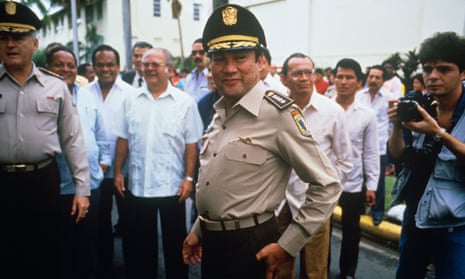It was a Christmas miracle. On 25 December 1989, Panamanian dictator Manuel Noriega, who has died this week, sought refuge in the Papal Nunciatura (the Vatican’s embassy in Panama). Noriega was facing a US indictment for narco-trafficking, as well as claims of electoral fraud. To smoke him out, General “Mad Max” Thurman ordered construction of a “musical barrier” around the embassy – constant barrages of sound played from the speakers of encircling US army Humvees.
The first day was something of a truce – Christmas music. But thereafter, things rapidly descended towards classic rock. Noriega was an opera fan. Instead of Verdi, he got a psyops playlist that included Billy Idol’s Flesh for Fantasy, Welcome to the Jungle by Guns N’ Roses, God Bless the USA by Lee Greenwood, We’re Not Going to Take It by Twisted Sister, several songs by the Doors: Strange Days, People Are Strange, The End War Pigs by Black Sabbath, Electric Spanking of War Babies by Funkadelic, and most worryingly of all: If I Had a Rocket Launcher by Bruce Cockburn. Faced with the sanity-destroying power of middle-American mallrat music, Noriega surrendered.
At the time, President George Bush considered the tactic excessive, but use of it only grew. In 1993, the FBI turned its speakers on the Branch Davidians, a religious cult, at the Waco siege in Texas. There, they skipped the metal for brain-frazzle eclecticism: Tibetan chants, bugle calls, Christmas carols, Nancy Sinatra’s These Boots Are Made for Walkin’.
In grimmer circumstances, Justin Bieber has been used on loop to break down detainees in Guantánamo Bay. In Iraqi jails, Barney the Dinosaur, Sesame Street and Metallica were used to culturally offend and sleep-deprive prisoners. Barney’s I Love You was a particular favourite – “I love you, you love me – we’re a happy family / With a great big hug and a kiss from me to you / Won’t you say you love me too?” – because it was what psyopers refer to as “futility music”, inflicting such levels of banality that the suspect begins to feel apathy towards their own extremist positions. Others were more obvious morale-busters: Camp X-Ray’s wake-up call was once Born in the USA – though it’s unclear whether prisoners or guards understood its powerfully anti-Vietnam anti-Uncle Sam nuance.
Despite long-standing queries over how effective it really is, the practice is now so widespread that, in 2008, various musicians including Rage Against the Machine and Massive Attack launched an initiative called ZerodB, to try to stamp it out. It’s a strange, backhanded compliment to the emotion they put into their songs in the first place. The fact that music is so psychologically powerful means that, like a loaded gun, it can just as easily be turned to evil.

Comments (…)
Sign in or create your Guardian account to join the discussion